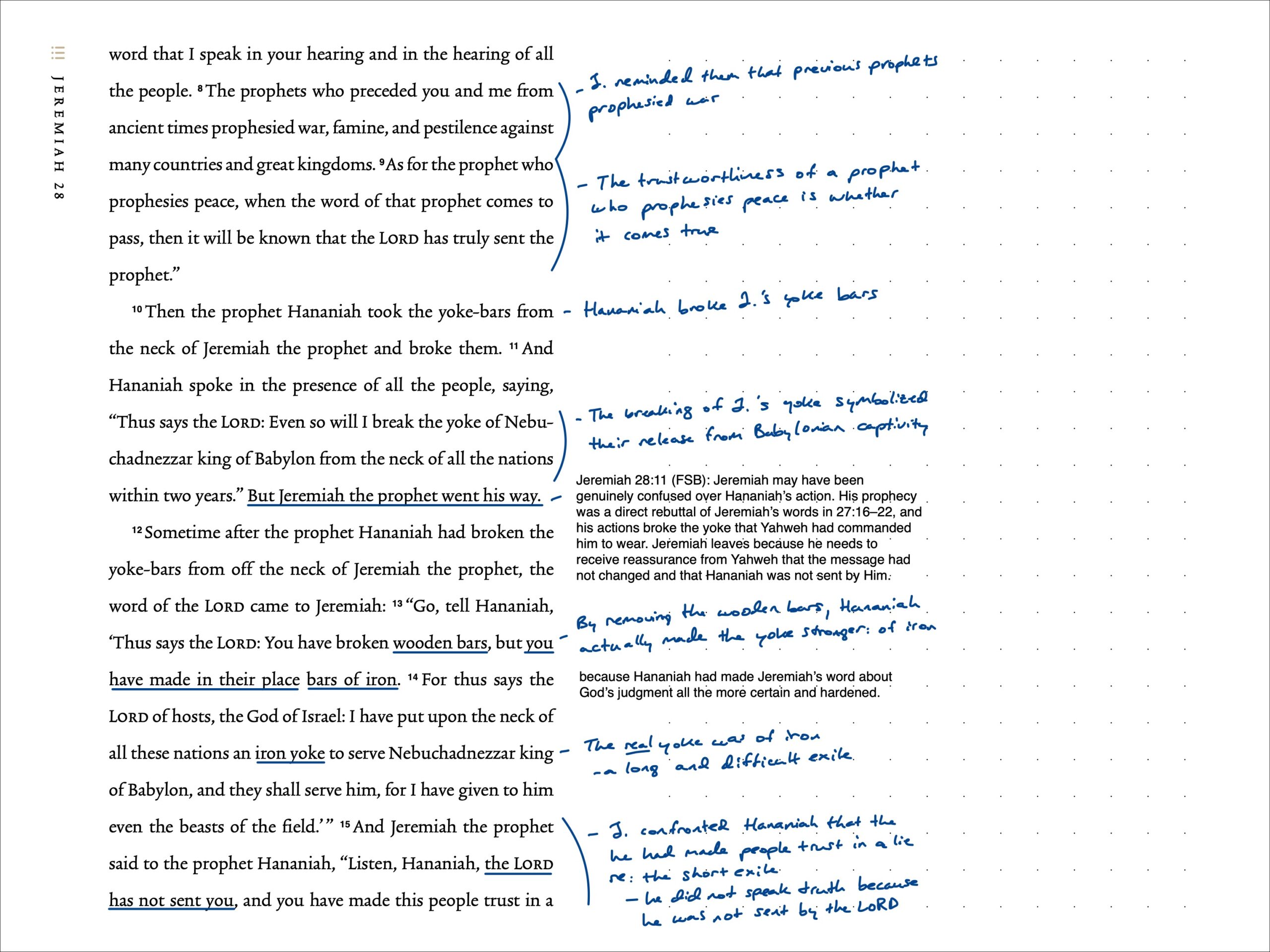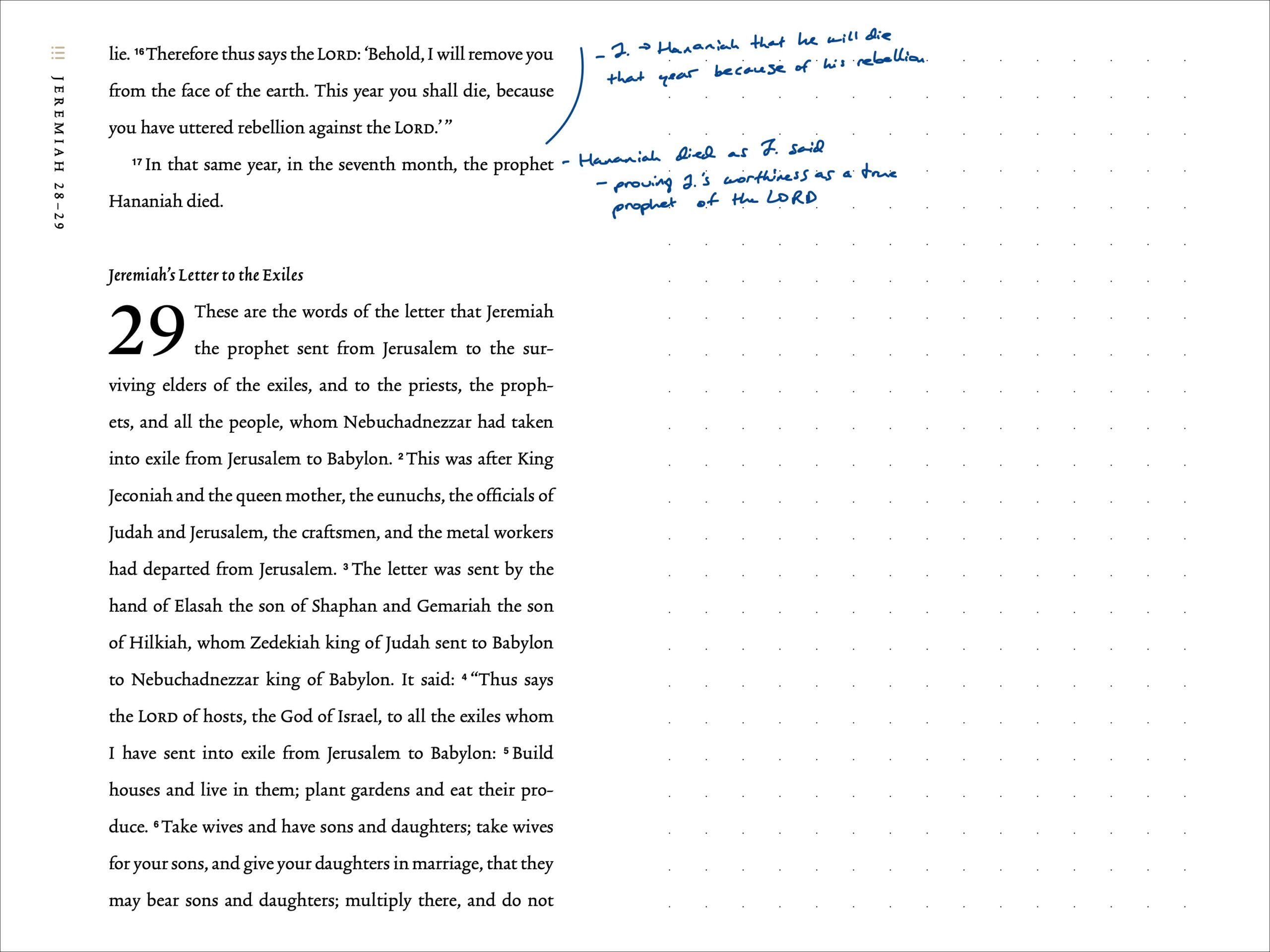| Date | Version | Reading Plan |
|---|---|---|
| @July 21, 2023 | ESV (2016) | ESV Prophets Plan 2023 |
Pericopes
- Hananiah the False Prophet
Notes
The chapter opens with a prophecy given by Hananiah in the presence of the priests and all people that the vessels, priests and people will all return from Babylonian exile “Within two years” (Jer. 28:3). Like Jeremiah, Hananiah was a native of Gibeon in the territory of Benjamin, about 6 miles northwest of Jerusalem.
In Jer. 28:5, Jeremiah responded favorably to Hananiah among the priests and people with an emphatic “Amen!” to his prophesy. Even though Hananiah’s prophecy directly contradicted Jeremiah’s of a long exile, Jeremiah seemed to desire its truthfulness by saying, “may the LORD make the words that you have prophesied come true” (Jer. 28:6). Whether he was sincere or was speaking sarcastically from being thrown off balance is difficult to say.
In Jer. 28:8-9, Jeremiah reminded the people that previous prophets prophesied “war, famine and pestilence against many countries and great kingdoms” (Jer. 28:8). The trustworthiness of a prophet who speaks a word of peace as coming from the LORD is whether or not it comes true (Jer. 28:9).
In Jer. 28:10-11, Hananiah breaks the yoke-bars from Jeremiah’s neck, symbolizing a relatively swift release of the people from Babylonian captivity. After being freed, Jeremiah “went his way” to separate himself and receive reassurance from God that the message had not changed and that Hananiah’s prophecy was not of the LORD.
In Jer. 28:13, God tells Jeremiah to confront Hananiah; that by removing the wooden yoke bars he actually had “made in their place bars of iron”. Hananiah’s false prophecy of short exile only made Jeremiah’s word of God’s judgment all the more certain and hardened. The real yoke was to be “an iron yoke to serve Nebuchadnezzar” for the LORD had “given to him even the beasts of the field” (Jer. 28:14).
In Jer. 28:15-16, Jeremiah faced Hananiah, telling him that the LORD had not sent him and that he had made the people trust in a lie. Jeremiah told Hananiah that his false word would lead to his own death that year. In the final verse (Jer. 28:17), this is fulfilled as Hananiah died “In that same year, in the seventh month”. This dispelled any uncertainty around who was the LORD’s prophet and cemented the understanding that the coming exile would be long and difficult.
Application
This is such a great chapter as we see the battle of the prophets, Jeremiah and Hananiah. It plays out almost as a heroic narrative, with Hananiah coming on the scene to present a challenge to the story’s protagonist, Jeremiah. His prophesy of a brief exile is received favorably, even seemingly by Jeremiah, and the people are left to wonder who is the true prophet. But, it is God who has the final word (literally), speaking through Jeremiah that Hananiah was not of Him, climaxing in Hananiah’s death.
It may seem for a time that those who speak smooth words are winning, but their efforts heap burning coals on their own heads as God and His truth will have the ultimate victory.
Scripture Journal Notes
Commentaries & Resources Used
- ESV Study Bible. (Wheaton, IL: Crossway, 2008)
- Faithlife Study Bible (Lexham Press, 2016)
- Believer’s Bible Commentary (Thomas Nelson, 2016)
- CSB Study Bible Notes (Holman Bible Publishers, 2017)
- Matthew Henry’s Commentary on the Whole Bible (Guardian Press, 1976)
- The Bible: A Reader’s Guide (Sterling Publishing, 2011)
- The Infographic Bible (Zondervan, 2018)
- ESV Digital Scripture Journal (Crossway, 2019)


